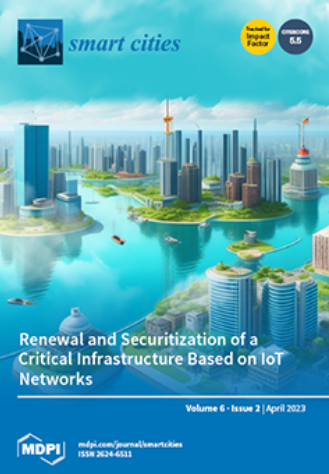Optimal Water Management Strategies: Paving the Way for Sustainability in Smart Cities
IF 5.5
Q1 ENGINEERING, ELECTRICAL & ELECTRONIC
引用次数: 2
Abstract
Global urbanization and increasing water demand make efficient water resource management crucial. This study employs Multi-Criteria Decision Making (MCDM) to evaluate smart city water management strategies. We use representative criteria, employ objective judgment, assign weights through the Analytic Hierarchy Process (AHP), and score strategies based on meeting these criteria. We find that the “Effectiveness and Risk Management” criterion carries the highest weight (15.28%), underscoring its pivotal role in strategy evaluation and robustness. Medium-weight criteria include “Resource Efficiency, Equity, and Social Considerations” (10.44%), “Integration with Existing Systems, Technological Feasibility, and Ease of Implementation” (10.10%), and “Environmental Impact” (9.84%) for ecological mitigation. “Community Engagement and Public Acceptance” (9.79%) recognizes involvement, while “Scalability and Adaptability” (9.35%) addresses changing conditions. “Return on Investment” (9.07%) and “Regulatory and Policy Alignment” (8.8%) balance financial and governance concerns. Two low-weight criteria, “Data Reliability” (8.78%) and “Long-Term Sustainability” (8.55%), stress data accuracy and sustainability. Highly weighted strategies like “Smart Metering and Monitoring, Demand Management, Behavior Change” and “Smart Irrigation Systems” are particularly effective in improving water management in smart cities. However, medium-weighted (e.g., “Educational Campaigns and Public Awareness”, “Policy and Regulation”, “Rainwater Harvesting”, “Offshore Floating Photovoltaic Systems”, “Collaboration and Partnerships”, “Graywater Recycling and Reuse”, and “Distributed Water Infrastructure”) and low-weighted (e.g., “Water Desalination”) strategies also contribute and can be combined with higher-ranked ones to create customized water management approaches for each smart city’s unique context. This research is significant because it addresses urban water resource management complexity, offers a multi-criteria approach to enhance traditional single-focused methods, evaluates water strategies in smart cities comprehensively, and provides a criteria-weight-based resource allocation framework for sustainable decisions, boosting smart city resilience. Note that results may vary based on specific smart city needs and constraints. Future studies could explore factors like climate change on water management in smart cities and consider alternative MCDM methods like TOPSIS or ELECTRE for strategy evaluation.最佳水资源管理战略:为智慧城市的可持续发展铺平道路
全球城市化和不断增加的用水需求使得有效的水资源管理至关重要。本研究采用多准则决策(MCDM)来评估智慧城市水管理策略。我们使用代表性标准,采用客观判断,通过层次分析法(AHP)分配权重,并基于满足这些标准的评分策略。我们发现“有效性和风险管理”标准的权重最高(15.28%),强调了其在战略评估和稳健性中的关键作用。中等权重的标准包括“资源效率、公平和社会考虑”(10.44%),“与现有系统的集成、技术可行性和易于实施”(10.10%),以及生态缓解的“环境影响”(9.84%)。“社区参与和公众接受”(9.79%)认可参与,而“可扩展性和适应性”(9.35%)关注不断变化的条件。“投资回报”(9.07%)和“监管和政策一致性”(8.8%)平衡了财务和治理问题。两个低权重标准“数据可靠性”(8.78%)和“长期可持续性”(8.55%)强调数据的准确性和可持续性。“智能计量和监控、需求管理、行为改变”和“智能灌溉系统”等高度加权的策略在改善智能城市的水管理方面特别有效。然而,中等权重(如“教育活动和公众意识”、“政策和法规”、“雨水收集”、“海上浮动光伏系统”、“合作与伙伴关系”、“灰水回收和再利用”和“分布式水基础设施”)和低权重(如“海水淡化”)战略也有贡献,可以与排名较高的战略相结合,为每个智慧城市的独特环境创建定制的水管理方法。该研究具有重要意义,因为它解决了城市水资源管理的复杂性,提供了一种多标准方法来增强传统的单一焦点方法,全面评估智慧城市的水资源战略,并为可持续决策提供了基于标准权重的资源分配框架,从而增强了智慧城市的弹性。请注意,结果可能会根据特定的智慧城市需求和限制而有所不同。未来的研究可以探索气候变化等因素对智慧城市水管理的影响,并考虑TOPSIS或ELECTRE等替代MCDM方法进行战略评估。
本文章由计算机程序翻译,如有差异,请以英文原文为准。
求助全文
约1分钟内获得全文
求助全文
来源期刊

Smart Cities
Multiple-
CiteScore
11.20
自引率
6.20%
发文量
0
审稿时长
11 weeks
期刊介绍:
Smart Cities (ISSN 2624-6511) provides an advanced forum for the dissemination of information on the science and technology of smart cities, publishing reviews, regular research papers (articles) and communications in all areas of research concerning smart cities. Our aim is to encourage scientists to publish their experimental and theoretical results in as much detail as possible, with no restriction on the maximum length of the papers published so that all experimental results can be reproduced.
 求助内容:
求助内容: 应助结果提醒方式:
应助结果提醒方式:


